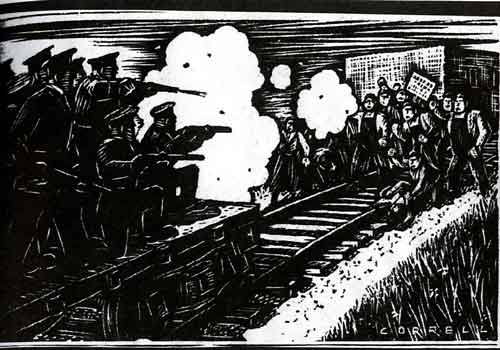Ahhh, Independence Day. A holiday intended to honor and celebrate America’s brave beginnings and illustrious history. A holiday of opposing emotions. And much like Thanksgiving, for many of us it may be filled with food, family, and fun. But also like Thanksgiving, it acts as a strange facade for a history that is far more complex and sometimes entirely and deliberately buried and forgotten. Michael Munk’s book The Portland Red Guide offers a slice of this complex history. Specifically, Portland was a quintessentially patriotic American city in the truest sense of patriotism, and its citizens exercised their right to free speech often and loudly. While “Keep Portland Weird” is one of the notions associated with the city nowadays, Portland was actually quite weird and wild far before the current stereotype came into, and fell out of, fashion. It was fertile grounds for various social movements and political change, and the Portland Red Guide honors the real history of what was once a blue-collar town:
The main purpose of the Red Guide is to offer a respectful rendering of the mostly forgotten people, organizations, and events that challenged the dominant powers of their day in the name of justice and equality—of which the victory of the 1934 strikers is a remarkable exception to a long list of defeats. An informal guide to Portland’s radical past, the Red Guide links notable radicals, their organizations, and their activities to physical sites associated with them. It honors those that the mainstream histories of Portland largely ignore. (Michael Munk, Portland Red Guide)
On July 11, 1934, one of the most pivotal events in Portland history took place in what is now Pier Park. The hundreds of laborers from Portland’s riverfronts, who spent long days for little pay unloading and loading the ships coming in and out of Portland’s busy docks, had been on strike for nearly a month. They won a victory in what was ultimately a class war between wealthy businessmen and blue-collar workers. It led to the formation of today’s International Longshore and Warehouse Union, which has among its members such organizations as Portland Locals 8 (Longshore), 40 (Checkers), 90 (Walking Bosses), 5 (Powell’s Books) 28 (Kaiser Permanente Security), 50 (Astoria), 12 (North Bend), and the Columbia River Pensioners Association.
Thinking of the striking laborers at Pier Park that summer eighty-two years ago (where for a long time you could still find bullets embedded in the douglas firs around the park), their bravery and courage for fair hours and wages and the right to create a union speaks more to me of celebrating our country’s freedom than the stories of rich landowners in the thirteen colonies trying to gain freedom from the British monarchy. The protesters on Bloody Wednesday exercised their right to speak out against social injustice and create communities for change and equality. I’ll light a sparkler to that.

